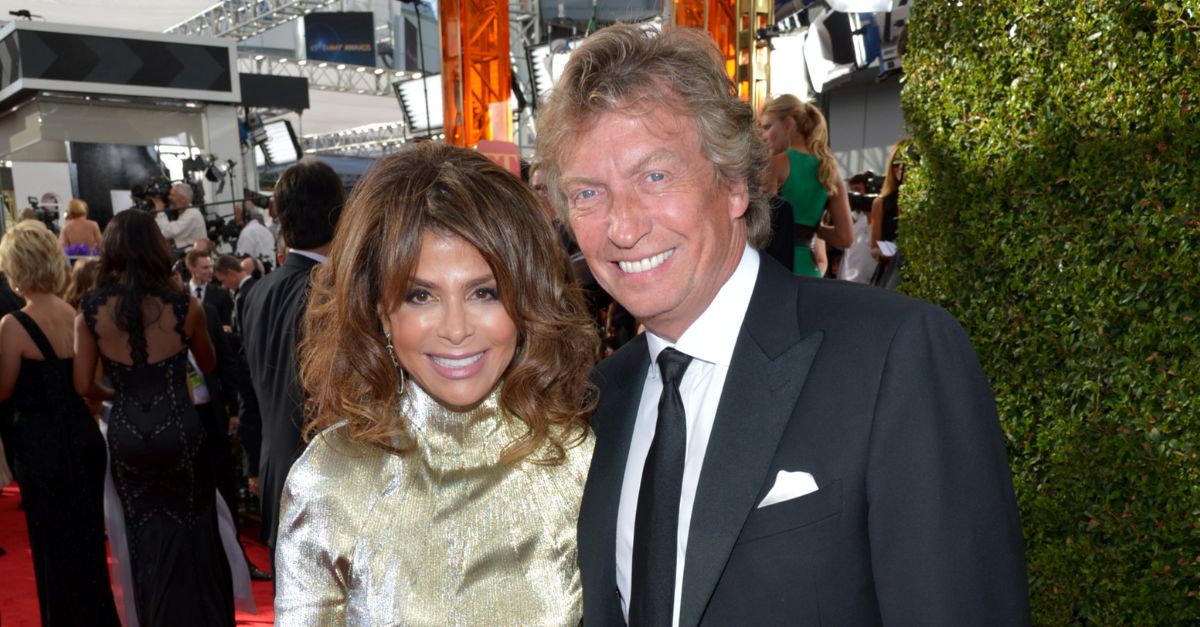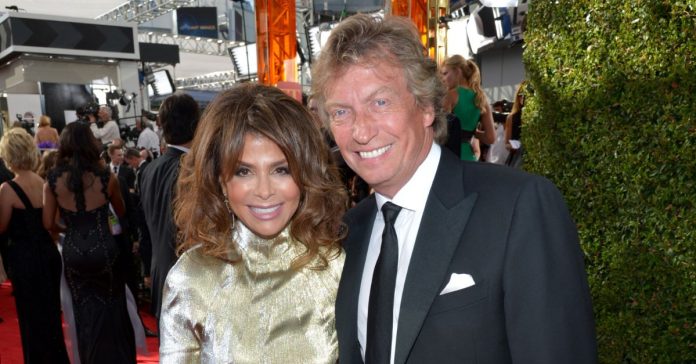
IMAGE DISTRIBUTED FOR ACADEMY OF TELEVISION ARTS & SCIENCES – From left, Paula Abdul and Nigel Lythgoe arrive at the 65th Primetime Emmy Awards at Nokia Theatre on Sunday Sept. 22, 2013, in Los Angeles. (Photo by John Shearer/Invision for Academy of Television Arts & Sciences/AP Images)
On Dec. 29, just two days before the statute of limitations was set to expire, Paula Abdul sued “American Idol” producer Nigel Lythgoe and the show’s production companies alleging that Lythgoe sexually assaulted her and the companies actively covered it up. The 61-year-old singer appeared on air as a judge on Fox’s “American Idol” from its launch in 2002 until 2009.
Abdul, a Grammy winner, has had six number-one singles and was once tied with Diana Ross for having the third most chart-toppers among female solo artists. Her lawsuit against Lythgoe was filed in Los Angeles Superior Court and asks for unspecified damages.
Here are some key takeaways from the 16-page complaint.
1. Abdul said Lythgoe sexually assaulted her on two specific separate occasions
In her complaint, Abdul described two instances during which Lythgoe sexually assaulted her. The first was during an early season of “American Idol” while judges were on the road for regional auditions. Abdul said that one evening, she and Lythgoe were in a hotel elevator when Lythgoe “shoved Abdul against the wall, then grabbed her genitals and breasts, and began shoving his tongue down her throat.” Abdul said she tried to push him away and “let him know that his behavior was not acceptable,” and ran out of the elevator once the doors opened. No specific date was given for the incident. “American Idol” began airing in 2002.
Abdul also described a second assault which she said occurred in late 2014. Abdul said that she and Lythgoe were discussing Abdul’s appearing as a judge on “So You Think You Can Dance,” a competition show in which Lythgoe served as both producer and judge, over dinner at Lythgoe’s home. Abdul said that after dinner, “Lythgoe forced himself on top of [her] while she was seated on his couch and attempted to kiss her while proclaiming that the two would make an excellent ‘power couple.”” Abdul said she pushed Lythgoe off of her, and immediately left. She said she never discussed the incident out of fear of being “blackballed” in the entertainment industry.
Abdul said the behavior amounted to gender violence and a form of sex discrimination under California law. According to her complaint, the corporate defendants were told, but “actively shield[ed]” Lythgoe from responsibility
2. Not just Paula — and not just Nigel
Abdul alleged in her complaint that she was the victim of “multiple sexual assaults” and “harassment” committed not only by Lythgoe, but also by “other executives, employees, agents, and/or representatives” of “American Idol” and the various production companies named as defendants. However, no specific details of any assaults committed by other individuals were provided in the complaint and Abdul said Lythgoe was the “impetus of much of the harassment.”
Abdul also said she personally witnessed Lythgoe sexually assaulting her assistant. Per the complaint, in 2015, Lythgoe approached Abdul and an assistant — referred to by the alias “April” in the complaint — from behind, pressed himself up against the assistant, and began to grope her.
3. Lythgoe and the other defendants may not be surprised by the lawsuit
Abdul said in her complaint that Lythgoe knew and was aware that his behavior toward her was “inappropriate and even criminal.” The singer even said that “at one point, Lythgoe called Abdul and taunted her that they should celebrate because it had been ‘seven years and the statute of limitations had run.’”
“Lythgoe clearly knew that his assaults of Abdul were not just wrong but that he held the power to keep her silent,” Abdul summarized in the complaint.
Abdul also said that the corporate defendants were well aware of Lythgoe’s “indecent conduct.” To underscore the point, Abdul included a 2008 link to a “MADtv” parody of “So You Think You Can Dance.” The clip shows a person portraying Lythgoe making openly sexual comments to actors portraying then-presidential candidate Barack Obama and future first lady Michelle Obama.
4. Paula Abdul says she was underpaid as a judge on “American Idol”
Abdul said in her complaint that she was the only “American Idol” judge “with American celebrity status,” and touted her credentials as an international pop star and Grammy winner. Abdul said that during the eight seasons she served as a judge, ratings “skyrocketed,” then immediately plummeted as soon as she left the show.
Abdul described her paycheck, however, as “pennies to the dollar” of what the male judges earned.
Despite the positive impact Abdul said she had on the show, she described her relationship with her producers and co-judges Randy Jackson and Simon Cowell as “strained from the start.” Abdul said she was paid less than the male judges and was the target of “constant taunts, bullying, humiliation, and harassment” during a time when she was undergoing multiple spinal surgeries.
5. Abdul said she was silenced by her contract
Abdul said that the terms of her contract prohibited her from publicly discussing any “confidential business information,” or saying anything derogatory about the shows on which she appeared or the people associated with those shows. She explains that she did not raise her sexual harassment allegations prior to the recent lawsuit out of fear of retaliation for violating the terms of that contract.
6. Abdul’s complaint was filed on December 29, 2023 — just two days before the statute of limitations would expire
In September of 2022, the California Legislature temporarily extended the statute of limitations for certain sexual assault claims until December 31, 2023.
7. Lythgoe never wanted her on “American Idol” because she was a “has been”
“American Idol” was an American version of the British show “Pop Idol.” In her complaint, Abdul said that during meetings leading up to the first season of “American Idol,” she was “insulted and belittled by Lythgoe.” She said he called her a “has been” celebrity and said the show’s contest would not know her. Abdul said she left the meeting with “grave reservations” about appearing on the show, but since other producers seemed to downplay Lythgoe’s concerns and “cajole” her, she decided to do the show.
8. Abdul said footage of her was manipulated to make her look bad
During the eight seasons Abdul judged “American Idol,” she was often the subject of media attention for behavior said to show her to be “drunk” or acting “strange.”
Abdul said in the complaint that “show producers often edited or misleadingly displayed footage of Abdul that made her appear to television audiences as if she were inept, which was not true.” Although she did not specifically mention specific behaviors or explanations thereof, Abdul made the allegation of manipulated footage together with the statement that the defendants’ misconduct happened at a time they knew she was undergoing multiple spinal surgeries.
“Ms. Abdul should be commended for the immense courage required to take action against the type of abuse that was inflicted upon her,” said Abdul’s attorney Neville Johnson in a statement, “particularly when the alleged abuser is a figure so dominant in her profession. It was clearly a difficult decision to make, but Ms. Abdul knows that she stands both in the shoes and on the shoulders of many other similarly situated survivors, and she is determined to see that justice is done.”
Representatives for Lythgoe could not be reached for comment, but the New York Times reported Monday that he denied all the allegations.
Have a tip we should know? [email protected]

